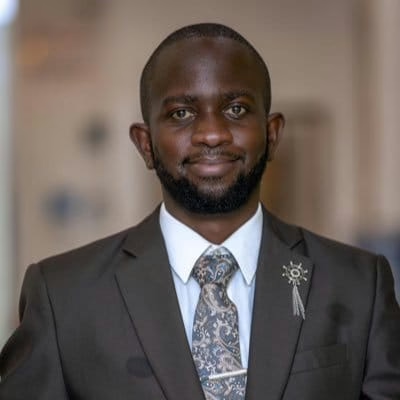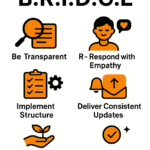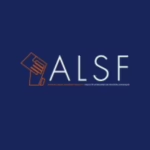A Lawyer for the People: Featuring Abner Collins Mango
The Series of Coincidences That Led Me to Public Interest Litigation
After his admission to the Bar in 2020, Abner joined the firm of Brian Otieno & Advocates, where he practiced until April 2024. “I felt it was time to explore practicing the law in other ways because I had joined the firm as an associate, had risen to a senior associate, and by the time I left, I was heading the litigation department, which had a team of five associates and seven interns.”
While at his previous firm, he handled all manner of litigation, including criminal law practice, family law practice, cases in the Environment and Land Court (up to and including special areas of practice like mining law and disputes from development conveyancing), in the Employment and Labor Relations Court (represented one of the biggest workers unions in Kenya, the Kenya County Government Workers Union).
Abner’s passion for litigation shines through as he highlights that besides supervising his team of litigators, the training element was the highlight of his job. “I have been able to train a number of young advocates, and seeing them doing well gives me a lot of joy and satisfaction.” Mr Mango now runs his law firm, BNK Advocates, in Karen.
So, how did Abner end up in Public Interest Litigation (PIL)? It all started with the LSK elections held in February 2024. The reconstitution of the council created opportunities to join various committees within the council. Abner applied to two committees: the Environment, Land & Climate Justice Committee and the Public Interest Litigation (PIL) Committee. Moreover, he had been on the Court User Committee at the ELC (Environment and Land Court) Bar Bench in the previous term. However, when the LSK rolled out the list, he was chosen for the PIL Committee, which came as a surprise to him.
When the PIL committee convened for the first meeting, Abner realized that he was in the right place. “I met amazing people, people who’ve been knocking on doors and doing great things in PIL; I’m talking about the Ochiel Dudleys, the Evans Ogadas, you know, those people who do PIL all the way to the Supreme Court.”
Just as Abner came into the PIL committee, the unimaginable happened; the anti-finance bill protests erupted. The countrywide protests kicked off peacefully with protesters walking quietly carrying placards and the Kenyan flag. However, chaos erupted when the police responded by arresting the peaceful protesters
According to Abner, thisspoke to his humanity. “I was touched because these were people who were out there for a noble cause; they were calling for accountability in governance. The least you could do is allow them to peacefully demonstrate, picket, and champion their rights.”
Like most lawyers involved in the protests, Abner’s role began with police station action. They rushed to any police station to bail out arrested protesters. The protests ushered Abner into becoming a lawyer for the people.
On the Frontline As The People’s Lawyer
Besides the arbitrary arrests, the government went a step further and began charging the arrested protesters with a range of general public order offenses. “You’d find all kinds of charges you can imagine, from drunk and disorderly to unlawful assembly and causing disturbance.” The first big incident we handled outside the police station was at the Milimani Law Court. “We had over 300 people arraigned in court, and I remember leaving the Courthouse at midnight. Three hundred and fifteen people locked up in a cell is not a small number, meaning that the police did not even manage to feed all of them. It was so bad that some young people collapsed during the court sessions. Some were even injured and walked into court limping.”
Another heartbreaking incident occurred at City Court, where 181 were arraigned, and we had to argue for them. For the record, all those charges have been dropped, and this is among his highlights in the social justice space.
Abner Mango’s first taste of Public Interest Litigation was on the Baby Pendo case, a file that was opened in 2017. The ripple effect from the protests is that the lawyers who had dedicated themselves to serving the public pro bono, keeping the protesters out of jail, formed a group and worked closely with the LSK to uphold the rule of law.
For Abner, the first experience that drove home the fact that what they were dealing with was abnormal was during the 2nd largest protest before the invasion of Parliament. On 25 June 2024, thousands of protesters stormed the Kenyan Parliament Building in Nairobi in response to the passing of the Kenya Finance Bill 2024, part of a larger series of protests against the proposed tax increases.“What the police used to do was arrest anyone within the streets of Nairobi who looked like they were in the mood of the protests. So, they used to arraign a lot of people and put them in police stations, then release them in the evenings.”
The advocates in Nairobi strategized by ‘adopting’ the police stations, and he was assigned to the Central Police Station. “We’d receive information that there’s a certain vehicle carrying a specific number of arrested individuals, so as soon as they arrive at the police station, make sure that one, they’re booked because we had incidents where people were not booked in the OB so their whereabouts remain unknown. Two, get their details, and three, if possible, get their contact details.
Besides the long hours, Abner and his fellow advocates also faced harassment at the police stations as the protests progressed. He recalls an incident where the police refused to let them see their clients (the arrested protesters).
“Their demeanor became hostile. You are no longer welcome at the police station. You have to leave.” We told them the detainees have a right to representation according to Article 41 of the Constitution. The more detainees were arrested, the more hostile the police got. They started chasing us and only fell short of arresting us. We were tear-gassed and forced to exit the police station.”
The advocates stood their ground, and better yet, more advocates joined them at the police station despite the tear gas. Finally, the police agreed to release the detainees to the advocates. No one was arraigned in court.
PIL: The Baby Pendo Case
Abner’s intervention during the protests and his membership in the PIL Committee saw him receive a brief from the LSK to challenge the Presidential Task Force on Human Resources for Health. Second, a training opportunity on Human Rights Documentation arose courtesy of the Office of the High Commissioner on Human Rights at the UN in collaboration with Partners in Justice International (PIJ). He represented the LSK in the training.
“The LSK identified a gap/ need for training because we have so many things happening, yet the occurrences go undocumented. So, the Office of the High Commissioner on Human Rights at the UN organized for the training to train the LSK and the UNHCR on Human Rights Documentation.”
One of the topics covered during the training was the Partners in Justice International’s work in human rights documentation, particularly regarding command responsibility, which is where the Baby Pendo case fell.
“After the training, I received instruction from the LSK to proceed and watch brief on their behalf and that of the victim. Finally, after 12 years, 12 police officers would be charged not under Kenyan Criminal Law but under the International Crimes Act.” The LSK is one of ten organizations involved in the Baby Pendo case to ensure justice for the victim. (One of the biggest cases the LSK is handling).
The Baby Pendo case has been a roller-coaster characterized by four consecutive deferrals of plea taking between October and January, with the most recent deferral being on January 29th, 2025. Nonetheless, despite the setbacks that keep emerging in this particular case, Abner finds fulfillment in serving his fellow citizens through PIL.
He recounts an experience whereby he was having lunch at a restaurant, and two young men he could not recognize approached him and thanked him for bailing them out during the protests. “That touched my heart because there is no paycheck that can amount to touching people’s hearts and changing their lives. It makes it all worth it.”
Reflections On Receiving the PIL Award and the Future of PIL
Abner considers receiving the PIL award a badge of honor because it is a big deal to be recognized by your peers and some seniors in a space where many advocates are doing outstanding things. He adds that the award is a big motivator to keep championing the rule of law.
“I have a lot of gratitude because it’s a recognition of the sacrifice. Normal Abner Mango would have been at his desk arguing applications and drafting submissions, which are my bread-and-butter issues, and that’s what I love doing. However, going out of my way to ensure these vulnerable citizens are represented and tell them, “You know what? You have a right to assemble, and no one can take that right away from you.” The people seeing that you are dedicated to standing up for their rights is really satisfying.”
Interestingly, most of the protesters that Abner helped bail out were vulnerable youth from street families with no contacts or even next of kin.
The Future of PIL
As highlighted earlier, the gala dinner where Abner was feted was the first event to recognize PIL’s efforts. What does such recognition mean for PIL? “There has been a great paradigm shift with the current LSK leadership, which has turned the narrative around the society around, especially Madam President Faith Odhiambo and the Secretariat. They have been very purposeful about encouraging members to participate in PIL, bringing it to light, and rejuvenating it.”
Besides the intentionality of the LSK leadership, Abner also recognized the domino effect that the June 2024 protests had on PIL, the fire it ignited among advocates. “I hope that this flaming torch is never extinguished because a lot of things that could have gone the wrong way are being averted. For instance, were it not for the police station interventions, who knows what would have happened to those who were arrested and not booked? The forced disappearances; if it was not for those numerous habeas corpus applications, who knows? Those three Kenyans who went missing for 60 days were it not for PIL, who knows?”
Abner also thanks the young lawyers who have taken this path passionately because, as Mother Teresa once said, service to humanity is service to God. “ I dedicate the award to each member who aided the protesters.
According to Abner, PIL in Kenya can get bigger and better with the right leadership. While the spark is positive, Abner, as a member of the PIL Committee, highlights that strategic partnerships and funding would go a long way in strengthening PIL initiatives by empowering society to advance PIL for the good of the people.












